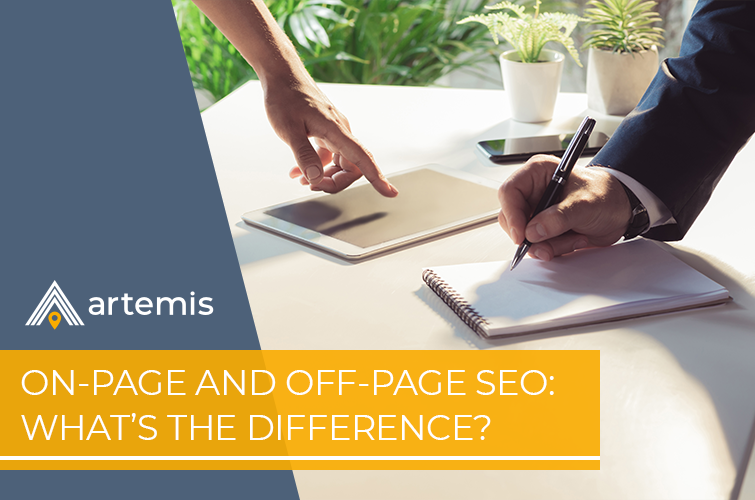On-Page and Off-Page SEO: What’s the Difference?

But the difference between on-page and off-page SEO might not immediately be clear – and it is always important to understand your SEO strategy, even if you have an agency doing the work for you.
So, here we present our guide to on-page SEO and off-page SEO, and discuss how the two come together to be effective in a quality campaign.
What’s the difference?
In basic terms, the distinction is simple and obvious: on-page SEO refers to anything that is done on your website to help you rise in search engine rankings. Off-page SEO is what occurs away from your website.
However, there are complexities in both, and it is important to understand the strategies for each and how they complement each other.
On-page SEO
You are in full control of your on-page SEO. This work includes everything that you do for your own website to boost yourself in the rankings. It can include everything from content creation and internal linking, through to more technical work such as URL structure and page loading speed.
When a search engine views your site, it takes into account a range of on-page signals, and these play a major role in how you rank for specific search terms.
Examples of important on-page SEO work
There are actually many different examples of on-page SEO and it is important to include all of them in your overarching SEO strategy. Some of the most important include:
- Quality content – the old SEO adage ‘content is king’ still certainly applies. Having great content on your website shows search engines that you can provide visitors with what they are looking for. There should be a real focus on quality – all content that you put on your site should be well-researched, relevant, exceptionally written and, most importantly, unique.
- Content structure – just as the quality of your content is vital, so is its structure. This refers to using the kind of signals that search engines like to see on a page to help them understand its intent. This means utilising headings tags correctly, and skilfully incorporating the keywords that you want to rank for.
- Linking (internal and external) – we’re not talking about incoming links here (we’ll get to that in a moment). On-page linking refers to links within the content on your site and where they point. Linking internally to other pages on your site is a vital element of good SEO, and it helps search engine crawlers to find their way around your site as easily as possible. It also makes navigation potentially easier for users. On the other hand, linking externally to high quality websites and trusted resources actually shows to search engines that your website is similar to theirs. External linking can also help you win backlinks.
- URL structure – sometimes overlooked, your URL structure has a big impact on your SEO. Well-formatted web addresses help search engines to understand the hierarchy of the site, and is another feature in easiest possible navigation for crawlers.
- Page loading speed – an increasingly crucial ranking factor, the speed a page loads is considered by search engines to be an indicator of its quality. Search engines want to present users with the page that they are looking for as quickly as possible. If sites are slow to load, users may click away.
- Meta title and description – the title of the page and the meta description are always the first thing a searcher sees when they find you in the listings. Using search-optimised phrases in title is an important signifier to search engines. Meta descriptions don’t actually affect your ranking, but failing to write one can lead to search engines automatically generating one.
Off-page SEO
Off-page SEO work refers to anything that affects how you rank that isn’t done on your website. Search engines don’t only consider your site when they rank you – they also consider how you are perceived by other sites. Do quality sites link to you? Do you have good ratings on independent review sites?
The stronger your off-site SEO, the better you will rank.
Examples of important off-page SEO work
There are many off-page factors that influence your SEO. Some important ones include:
- Google Business Profile– GBP is a free tool Google offers to business owners to allow them to appear in different location in organic search listings and Google Maps. The large bar appears in the right-hand side of the search results, making a striking visual impression. A well-optimised GBP profile can be a big boost for your local SEO.
- Reviews – your ratings on independent review sites such as Trustpilot, Facebook, Feefo, and especially Google Reviews are a crucial ranking factor. Getting good reviews indicates that your site is trusted.
- Link building – incoming links remain one of the most elements in search engines determining your perception online. Earning links on high quality sites shows Google that your website is trusted. It’s vital you avoid low quality links, as they can have a negative effect. Your focus should be on getting the best possible links you can.
At Artemis, we experts in all aspects of SEO. Our team can manage all elements of both on-page and off-page SEO. If you are interested in learning more, get in contact with our experienced team today.

